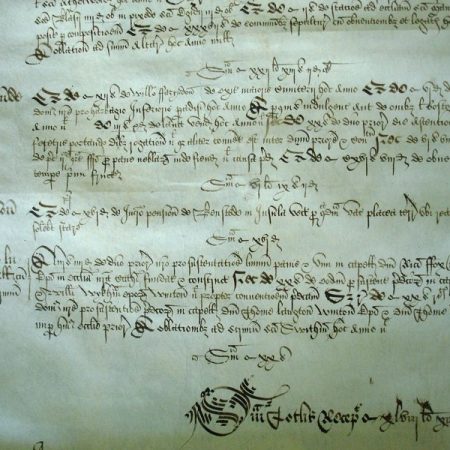Remote Talk on Winchester Cathedral Archives Breaks New Ground
Future historians might look on 30 April 2020 as a landmark day in social mores, when the Friends of Winchester Cathedral heard a talk delivered by video link using Zoom. This is the software that has become popular during the coronavirus pandemic and looks set to change the way we live.
The speaker was cathedral archivist and HAT Newsletter editor, David Rymill, who was introduced by Friends chairman and former BBC presenter Bruce Parker. The technology enabled a full-size slide to be show on screen, with a view of the speaker on a small sub-screen alongside.
Since 2014 the cathedral archives have been in the hands of Hampshire Record Office, where conservators and archivists have worked to make them an enduring and accessible record of more than 1,000 years of history.
The oldest record dates from 957AD, though is not directly concerned with the cathedral. It perhaps came to what was then the priory of St Swithun in the 16th century. An apparently older charter of 854AD was in fact written much later to codify a grant that had probably involved a simple handover.
David gave examples of records at all times, including medieval account rolls, though unfortunately a mere 80 examples have survived from the approximately 2,000 accounts of obedientiaries (office-holding monks) that were generated in the period 1280-1537.
Other records have survived in the most surprising fashion – like the fragments of music manuscripts held in the Record Office and possibly originating from the Cathedral or another local monastery or parish church, reused to wrap wills.
Especially interesting was a diet roll, which contains accounts of food bought and served on different days of the week and on certain feast days.
The charters issued by Henry VIII to the Dean and Chapter after the Dissolution are handsome documents with elaborate capitals, including one showing William Kingsmill and others giving court to the king in the process of making the momentous change, and receiving from him the statutes laid down for the running of the Cathedral.
Very useful for tracing personnel are the Chapter Books, which survive in an unbroken run from 1553, with the exception of the Civil War and Commonwealth years, and also of 1600-1622, a gap which is fortunately plugged to some extent by the diary of Dean Young, a selection from which has been published.
David told the story of Chapter Clerk John Chase, who was traumatised by the vandalism during the Civil War of the soldiers, who threw records in the river – some of which were supposedly later fished out by the brothers of St Cross! – and fashioned kites from others.
There was much more, including the story of the register of banns recently recovered walled up in the cathedral.
Also, David demonstrated how to access the cathedral records via the HRO online catalogue, via Advanced Search, with the topic in the top line (e.g mason*, delivering ‘masons’, masonry’ etc) and the Finding No. ‘dc’ for Dean and Chapter).
He also highlighted a site which gives access to all issues of the Winchester Cathedral Record, to which the 24 publications of the Friends have recently been added, according to Tom Watson, who gave a vote of thanks. Further information on the Winchester Cathedral Archive is available HERE
Time will no doubt tell whether this pioneering event is what the future will look like, or whether the social instincts of people will triumph.
All images by courtesy of the Dean and Chapter of Winchester.

